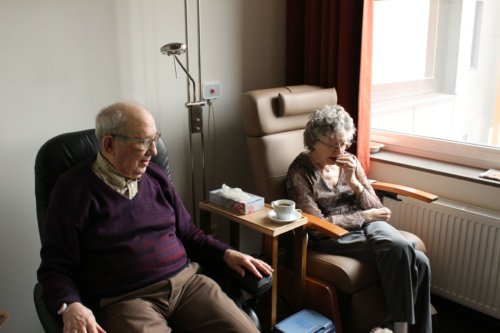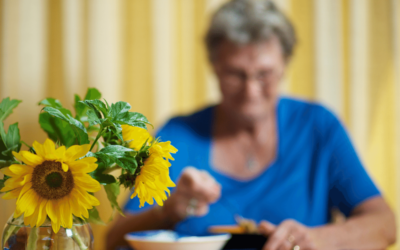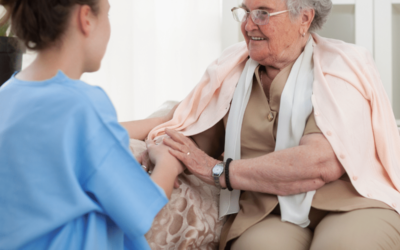7 Emotional Challenges of Caring for an Elderly Loved One

The elderly population of the UK is growing.
An aging population affects us all. Having an elderly loved one presents a myriad of challenges, be they physical, financial or medical – but underpinning any challenge is the emotional toll of being responsible for someone who has lost their independence.
The most recent report from the Office of National Statistics states that, in mid-2017, 18.2% of the populace were aged 65 or over, compared to 15.9% a decade earlier. This statistic is projected to increase to 20.7% by 2027.
There are 7 key emotional challenges that caregivers may experience. As the UK population grows exponentially, more and more of us will find ourselves needing to care for an elderly loved one. Here is Care24Seven’s guide on addressing – and dealing with – 7 emotional challenges of caring for an elderly loved one.
Worry
Having an elderly loved one in need of care is almost always a source of worry, ranging from mild concern to downright fear. You may perceive that the situation is beyond your control, that help and answers are increasingly beyond reach. And then there’s the problem of not always being around. What if Dad’s had a fall? What if Mum’s forgotten to take her medication? These are all very real worries.
It is imperative to heed your concerns. They exist because something needs to change. Whether it’s an alteration in living arrangements, lifestyle or professional support, understand that you are not alone. Help is out there.
Sadness
Witnessing the decline of a person you love dearly can have major emotional repercussions. You may be consumed with negative thinking; perhaps you’ll have trouble sleeping, or feel overwhelmingly like weeping. The key is to address the issue, not ignore it. You may need professional help yourself. Counselling and therapy can work wonders, even for those who are initially reluctant to open up about their problems.
Caregivers’ groups are commonplace now, where you can meet individuals experiencing relatable circumstances. Exercise can also prove to be a remarkable way of improving your mood and washing away some of that all-consuming melancholy. Open up to family and friends; you don’t have to go through this on your own.
Boredom
Being a caregiver can also take its toll by restricting your lifestyle and freedom. It won’t always be stimulating to be at home all day, taking care of someone, even if they are incredibly close and important to you.
If you find that your own wants and needs are wasting away, and you feel your life is passing you by, it may well be worth seeking some respite and having a break. Find things that give you a sense of purpose and meaning. Maybe you’re an avid reader; perhaps you need to get out socialising more. Take up a hobby or a craft; go for a run.
Engage with the environment of the home. Especially if you’re going to be a caregiver to your loved one on a long-term basis, make the space you’re spending so much time together in happier, homier, and more stimulating. Get painting, put up some shelves, hang some pictures, and involve the care receiver. You’d be amazed at how little is needed to vastly improve the atmosphere.
Finally, talk to your loved one. There’s an entire lifetime of memories, anecdotes and wisdom behind those aged eyes.
Embarrassment
There’s a whole host of reasons you might be embarrassed as a caregiver, especially when taking your loved one out in public. They might be loud, rude to strangers, difficult with servicepeople. Perhaps they have poor personal hygiene because they struggle with bathing. It is so easy to fall into the habit of simply not leaving the house so as to not encounter such situations – but this is unlikely to be an effective solution.
By shutting your loved one away, you are (unintentionally) signalling that they are the problem. This can be damaging to their self-esteem and happiness, especially given that they are already living a life restricted enough that they require a caregiver. The outside world is an invaluable source of stimulation to the caregiver-care receiver dynamic, and it can be very costly to remove this from the relationship. If you don’t feel you can cope on your own during trips out, there is no shame in requesting help from a trusted friend or family member.
Finally, it is crucial to remember that people are far more accepting, generous and empathetic than we generally give them credit for. It can feel isolating when your loved one is making a scene, but many more people than you realise will understand what you are going through and will respond with kindness, compassion and a healthy slice of humour.
Disgust
There’s no dancing around the subject: your loved one may need help with things you’d really rather not see. It can be disconcerting or unnerving to help your loved one bathe or go to the toilet, especially if they’re a family member. Messy eating, hygiene problems, vomiting, incontinence – these are all occurrences that might be unavoidable in your capacity as caregiver. So how to best deal with them?
Firstly, accept that the disgust reflex is a natural human reaction. It does not in any way define your relationship with your loved one or how much you love them. As a caregiver, it’s likely that you’re already an empathetic individual – so harness that empathy and accept that your loved one can’t help it.
It can be deeply embarrassing for them to require support in such intimate and private matters, so remain respectful, calm and light-hearted. Discuss ways of minimising the discomfort for both of you and keep the conversation honest and kind.
It is also worth considering additional support from an occupational therapist (OT). OTs specialise in finding practical solutions to everyday problems in the home and beyond for people who are physically or mentally hindered from completing requisite tasks. The Royal College of Occupational Therapists can help you find a professional in your area.
Anger
Being a caregiver sometimes demands you be a professional saint. If you never experience your patience being tested or feel like you’re at the end of your tether… you’ve probably not been in the role long enough! An elderly loved one may well act tetchy, impertinent or aggressive, but it is important that you keep calm and composed whenever possible and understand what they are going through: they have lost their agency and feel like life has had enough of them. Unless you happen to have the disposition of a Tibetan monk, how else can you address the feelings of anger you might have towards your loved one?
Communication is key. Honesty is often the best policy. Tell your loved one straight that you are finding their behaviour untenable and that, whilst you understand their frustration, it is taking its toll on you and is damaging your relationship. Individuals with dementia can be even more complex as they may be highly irrational and confused. In this case, speak simply. Do not get angry. If you need to vent, take yourself outside and breathe. Learn how and when to walk away and compose yourself.
Be kind, not only to your loved one but to yourself. This is a new path you are walking, and it is fraught with hazards. Take it in your stride and know that you are doing everything you can to ease their suffering.
Grief
Perhaps the most poignant of all the emotional challenges of caring for an elderly loved one is that of grief. Grief is a feeling of loss, and it doesn’t only relate to death. You are grieving the loss of the person you once knew, who may well have become a shell of their former self. If you are caring for your mother or father, the role reversal of who is looking after whom can be both heart-warming and saddening.
Seeing a loved one in decline hurts. Accept that your grief is normal. It is the inevitable consequence of loving someone. Celebrate the memories, the laughs you’ve shared, the waves of joy and sadness the two of you have experienced on the ocean of life. And embrace with wholehearted love the time you have left.
It is an admirable endeavour to take on caregiving responsibility for a loved one. Equally, there is no shame in admitting that you are feeling stretched and need additional support. We understand that it can be a huge step to accept someone new into your home, but every one of our carers here at Care24Seven is empathetic, respectful and highly professional.
With branches in Chiswick, Ealing, Hounslow and Richmond, why not get in touch today and find out how our experienced and friendly carers could change the lives of both you and your loved one.
Healthy Eating for Seniors
Healthy Eating for Seniors Healthy eating for seniors is extremely important for a number of reasons. Ensuring that you are properly nourishing the body is important at every stage of life, however,...
How Technology Helps Us Provide Expert Advice & Excellent Service
At Care24Seven, we are always looking for ways to help our carers provide the highest level of service. In addition to our excellent carer culture focused on training and development, we also have a...
How Can at Home Care Benefit the Mental Health of the Elderly After a Hospital Stay?
After being discharged from hospital following a major injury, surgery or illness it can be difficult to know what to do. Once a loved one has left hospital it is important to remember that this...


